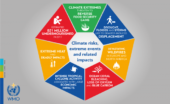Molly Minturn - My family is heartbroken to share that my father died in surgery on Monday, Feb. 10. It…
UN Convention on Climate Change, Durban 2011
Written by Diana Thebaud Nicholson // December 12, 2011 // Canada, China, Climate Change, United Nations // Comments Off on UN Convention on Climate Change, Durban 2011
Canadian Youth Delegation (CYD-DJC)

UNFCCC Durban Climate Change Conference – November 2011
The United Nations Climate Change Conference, Durban 2011, will bring together representatives of the world’s governments, international organizations and civil society. The discussions will seek to advance, in a balanced fashion, the implementation of the Convention and the Kyoto Protocol, as well as the Bali Action Plan, agreed at COP 13 in 2007, and the Cancun Agreements, reached at COP 16 last December.
+++++++++++++++++
Amid Durban climate talks disappointment, China provides unexpected hope
(CSM) While many environmentalists were disheartened by the Durban climate talks’ inconclusive results, China provided an unexpected ray of hope by abandoning its long-time refusal to discuss a carbon emissions cap.
Beijing has not yet agreed to cap its emissions, but in a hard-fought, last minute bout of negotiation it did agree to begin discussing the possibility of such a cap.
The conference was saved from failure by the deal between China, the United States, India, and the European Union to forge a new pact with legal force to replace the Kyoto Protocol.
The exact nature of the pact was left vague, and even the date when it will come into force is uncertain. Washington insisted that should be from 2020 rather than by 2020, but the deal marked the first time China had publicly countenanced the prospect of a legally binding commitment to limit its emissions.
Climate delegates strike a deal in Durban
The deal reached early Sunday at the UN-sponsored climate talks in Durban, South Africa, could lead to a major climate treaty by the end of the decade — exceeding expectations for the two-week summit. Delegates also agreed on the creation of a Green Climate Fund to help developing countries adapt to climate change, and to initiatives to preserve tropical forests and boost clean-energy technology. The New York Times (tiered subscription model) (12/11), The Economist/Newsbook blog (12/11), The Guardian (London) (12/11)
Damian Carrington — Climate deal: A guarantee our children will be worse off than us
(The Guardian) Getting a deal was a success, but a pitiful one. The world’s climate debt is soaring and postponing action threatens an environmental austerity far greater than today’s economic woes
Durban Climate Summit Saves Face at the Expense of Future Generations
(Canadian Youth Delegation) Despite the fact that COP17 is being touted as a success by the architects of its demise, global “leaders” in Durban did little more than lay a roadmap to devastation. They are celebrating the creation of a deal to find a deal at some point in the future while emissions rise and the planet cooks.
The Green Climate Fund is an empty piggy bank with no decision on the sources of finances. Should those nations in desperate need of adaptation financing shatter it they will find only the promises of the richest, most polluting nations. Unfortunately you can’t buy clean water, arable land and food security with promises.
While Kyoto survived in Durban, it is held hostage by polluting nations and corporate interests.
10 December
Climate talks end with late deal
(BBC) UN climate talks have closed with agreement on a package of measures described by the chair as “balanced”.
The European Union will place its current emission-cutting pledges inside the legally-binding Kyoto Protocol, a key demand of developing countries.
Talks on a new legal deal covering all countries will begin next year and end by 2015, coming into effect by 2020.
UN climate deal hailed by U.S., Brazil, India
(Globe & Mail) Delegates agreed on a United Nations climate change pact on Sunday that for the first time would force all the biggest polluters to take action to slow the pace of global warming.
The deal follows years of failed attempts to impose legally binding international cuts on emerging giants, such as China and India.
Are UN climate talks taking on too much?
For the 17th straight year, the UN Framework Convention on Climate Change, where politics are at play on the largest scale, wound up without a treaty that would keep the average global temperature from climbing more than 2 degrees Celsius, or about 3.6 degrees Fahrenheit, above pre-industrial levels. Could it be that the goal is too great? “There is a fundamental disconnect in having environment ministers negotiating geopolitics and macroeconomics,” said Nick Robins, an energy and climate change analyst at HSBC, the London-based global bank. The New York Times (tiered subscription model) (12/10)
9 December
Durban talks see Europe, least-developed countries issue 11th hour plea
(Canada.com) In a joint statement released Friday, the Europeans, along with groups representing small island states and the least-developed states touted progress on delivering an operational green climate fund and other provisions from 2010 agreements to improve international action on climate change.
But they said the gap remains too wide in achieving the ultimate objective of a new international regime that would be more effective and more comprehensive in covering rising emissions than the Kyoto agreement.
8 December
Climate “road map” stalls in Durban
The world’s three biggest polluters, China, the U.S. and India, were holding back support for a “road map” proposed by the European Union that would deliver the next global climate treaty even as, for the first time ever, developed and developing countries joined together to back such a plan. At least 120 countries — led by Brazil, Japan, Canada, as well as many African countries — support the proposal, under which all major polluters would negotiate a new pact in 2015 that would cut emissions after 2020. Bloomberg Businessweek (12/9), The Guardian (London) (12/8)
TZEPORAH BERMAN: Will Canada be left behind on climate change?
(Globe & Mail) The developing countries and big emerging economies have clearly stated that they’re willing to do their part, but only if developed countries take responsibility for the mess we’re in (there’s a time lag between carbon release and impact, and the current climatic changes are a result of the carbon locked into the atmosphere from pollution the developed world has spewed out) and recommit to existing agreements (referred to as the second round of Kyoto).
Canada’s position that it won’t agree to Kyoto or talk about a legally binding agreement until 2015 is swinging a wrecking ball through the conference.
Australia ‘playing games’ at climate talks
(ABC – Australia) Climate Change Minister Greg Combet says the Federal Government will only sign an extension of the Kyoto Protocol if it is part of a bigger agreement covering all major emitters.
He says Australia will keep meeting its commitments under the treaty, but a new approach is needed.
Global climate deal is now “beyond our reach,” Ban says
The glimmer of hope for a binding global climate agreement at UN climate talks in Durban, South Africa, was extinguished Tuesday after India and China indicated they would not accept international limits on their carbon emissions. “The ultimate goal for a comprehensive and binding climate change agreement may be beyond our reach for now,” said UN Secretary-General Ban Ki-moon. USA TODAY/The Associated Press (12/6), The Washington Post/Bloomberg (12/7)
Saying Kyoto’s ‘in the past,’ Kent fuels fears of Canada’s withdrawal
Environment Minister Peter Kent has repeated his sharp criticism of the Kyoto climate treaty at a high-level session of the United Nations climate negotiations in Durban, provoking a silent protest by Canadian activists who were quickly hustled out of the room.
China offers binding carbon targets
The heavily-downplayed UN climate talks in Durban, South Africa, were awash with excitement Monday after China appeared to advocate a legally binding pact on carbon emissions after 2020. “We accept a legally binding arrangement,” said Xie Zhenhua, the country’s chief negotiator, challenging the U.S. and other industrial powers to reconsider their stances, and do more to curb emissions of greenhouse gases. The Globe and Mail (Toronto) (12/6), The Wall Street Journal (12/6)
Low profile in Durban relegates Canada to margins of climate debate
While other countries have set up pavilions and exhibitions in Durban to promote their climate policies, Canada is missing in action. Other countries, even heavy polluters such as China and the United States, are organizing panels and speaking daily to the world’s media at the conference. Canada is nearly invisible, except for a tightly restricted briefing to a handful of Canadian media in a small hotel room, more than a kilometre from the conference site, where Environment Minister Peter Kent issues his daily statements.
5 December
Mike de Souza: Former negotiator says Canada blocking talks
(Post Media) … says that Canada’s negotiating tactics at international climate change talks are impeding progress, while protecting the interests of a single industry.
“I’m not so sure the objective is to achieve progress,” said Vic Buxton, 68. “I think the objective appears to me to be to make sure nothing is put in place in an international regulatory sense that can impede economic development in the Alberta tarsands.”
4 December
Thousands march in Durban for ‘climate justice’
Chanting “Amandla,” the rallying cry of the South African anti-apartheid movement, thousands of people have marched through the streets of Durban calling for “climate justice”.
Their appeal was aimed at diplomats locked in negotiations under the 194-nation UN Framework Convention for Climate Change (UNFCCC), which is tasked with beating back the ever-mounting threat of global warming.
Binding climate treaty is again on the table at Durban talks
The first week of climate negotiations in Durban, South Africa, ended with environmental groups and negotiators from nearly 200 countries again talking about the need for a binding international treaty. Christiana Figueres, the UN climate chief, said she believes countries can break the deadlock, while an EU plan to establish a new treaty to replace the Kyoto Protocol was meeting opposition from India and other developing countries. Reuters (12/3), The Guardian (London) (12/4)
Records show human role in warming, UN says
Global temperature statistics show that 13 of the warmest years ever recorded occurred over the past decade and a half, proving “unequivocally that the world is warming and that this warming is due to human activities,” Michel Jarraud, secretary-general of the UN World Meteorological Organization, said today in a statement. The climb in temperatures is expected to make extreme weather patterns such as floods and droughts even more severe, according to a WMO report. Reuters (11/29), ABC News (11/29)
Durban talks bog down over money
World leaders must act quickly to combat climate change, Christiana Figueres, head of the United Nations’ Framework Convention on Climate Change, said as negotiators gathered in Durban, South Africa. Efforts to craft a successor agreement to the Kyoto Treaty are deadlocked by significant disagreement between developing and wealthy countries, and both the Canada and U.S. are expected to raise objections against a climate fund designed to help developing countries manage climate change effects. AlertNet (11/28), The Globe and Mail (Toronto) (11/29)
28 November
Echoes from Durban: the 5 key people who will make or break COP17
(Carbon Talks) Negotiations in Durban are under way. Many advocates of more stringent action against climate change are holding their breath, but with little illusions. According to Le Monde, the following 5 people will be key to these negotiations
Why the Climate Negotiations Matter
by Matthew J. Hoffman Associate professor, international relations, University of Toronto.
(The Mark) Though any breakthrough in negotiations is unlikely, the multilateral meetings remain a pivotal space for the growth of innovative approaches to the coming climate crisis.
With little fanfare and lower expectations, the next installment of the UN climate-change negotiations is set to begin in Durban, South Africa. Even with ever-increasing evidence of the reality and danger of climate change, the international negotiations cannot compete with the ongoing global economic crisis for airtime, especially when the expectations for Durban are close to non-existent.
Slick Uniforms to Suit Canada’s Oily Negotiating Style
Today the Canadian Youth Delegation launched a new set of uniforms for our nation’s negotiating team in Durban. Emblazoned with corporate logos from Canada’s oil patch the uniforms show exactly how Canada is putting polluters ahead of people and standing in the way of global action to prevent runaway climate change.
27 November
Kent takes tough tone on Durban talks
(CBC) In a lengthy interview in Ottawa with The Canadian Press before heading off to negotiations in Durban, South Africa, Kent said Canada deserves recognition for promoting “responsible” industrial development and for pushing for a global climate change pact that would draw in all the major polluters.
24 November
EU Climate Chief on UN Summit: ‘Whatever We Pledge Should Be Equally Binding’
With UN climate talks starting next week in Durban, South Africa, hopes remain for new momentum in the drive to reduce CO2 emissions. In an interview with SPIEGEL ONLINE, EU Climate Commissioner Connie Hedegaard reveals Europe’s strategy. Divisions between rich and poor countries must end, she says.
23 November
UN chief slams rich nations’ plans to delay climate change treaty
(The Guardian) Achim Steiner says reaching an agreement in 2020 instead of at next month’s Durban conference would be ‘very high risk’
‘Climategate’ erupts again ahead of Durban conference
A fresh batch of stolen emails about climate change, written by scientists from the University of East Anglia, United Kingdom, has been released — days before global climate change negotiations begin in Durban, South Africa.
Climate scientists said that the release was likely to have been timed to “torpedo” any potential progress at the UN Climate Change Conference (COP 17) next week (28 November–9 December), according to the New York Times.
Greenhouse gas emissions reach record highs, UN says
The UN World Meteorological Organization reported today that concentrations of carbon dioxide in the atmosphere are growing and reached a record level last year. “The atmospheric burden of greenhouse gases due to human activities has yet again reached record levels since pre-industrial time,” WMO Secretary-General Michel Jarraud said in a statement. The Hill/E2 Wire blog (11/21), Bloomberg (11/21)
20 November
Amara Possian is blogging from Durban for The Mark
Canada’s obstructive approach to the negotiation of new emission-reduction targets has many international observers baffled.
Climate treaty hopes are pushed back to 2016
The world’s richest countries have effectively thrown in the towel on signing a new climate treaty in 2012, according to negotiators, who say an agreement could possibly be reached in 2016 but only if it only came into force in 2020. The delay is expected to dominate discussion at the next round of UN climate talks scheduled to begin next week in Durban, South Africa. The Guardian (London) (11/20)
18 November
IPCC: Climate impact risk set to increase
(BBC) The risk from extreme weather events is likely to increase if the world continues to warm, say scientists.
A report by the Intergovernmental Panel on Climate Change said it was “very likely” that emissions had led to an increase in daily maximum temperatures.
It added that emissions had also led some regions experiencing longer and more intense droughts.
The findings of the Special Report were presented at the IPCC’s 34th Session, which is being held in Kampala, Uganda.
17 November
Analysis: China Climate Role Could Be To Corner U.S.
(Reuters|Planet Ark) China, the world’s biggest carbon emitter, could nudge the United States into more action on climate change, rescuing the latest round of global talks and improving its international reputation.
Expectations remain extremely low that a new global deal can emerge from a summit later this month in Durban, South Africa.
But it could lay the foundations for a future deal and desperate negotiators are looking to China to help isolate the United States in its stubborn climate change denial, even if it is only for reasons of enlightened self-interest.
“My sense is that if Durban fails it would be due to the lack of U.S. political will to deliver and if it succeeds it would be due to China’s extra efforts,” said Jennifer Morgan, director of the climate and energy program at environmental thinktank the World Resources Institute.
Pan-African climate caravan delivers pre-Durban message
Some 300 African climate activists — among them farmers, environmental scientists and youth leaders — are traveling through 10 countries as part of a Caravan of Hope to draw attention to upcoming UN climate talks in Durban, South Africa. Caravan leaders are seeking commitments from rich countries to cut carbon emissions significantly, as well as financing to help poor countries develop in an environmentally sustainable manner. The Guardian (London)/Poverty Matters blog (11/16)
26 October
Chinese Scientists Warn of Significant Glacier Melt
(Spiegel Online) Glaciers are shrinking worldwide — some of them rapidly. Now Chinese researchers have sounded the alarm in their country too, where they say warmer weather and increased precipitation are reducing the size of glaciers. Water shortages and floods could result.
27 September
South Africa: In Need of a Unified Climate Change Policy
JOHANNESBURG (IPS) – The implementation of a unified climate change policy across all of South Africa’s government departments will not be easy as the divisions currently work largely as separate entities, says Greenpeace Africa.
The South African government announced on Sep. 13 that it would beef up its climate policy “to ensure that all government departments responded well to the issue of climate change.”
South Africa will host the 17th United Nations Framework Convention on Climate Change in Durban from Nov. 28 to Dec. 9, which aims to discuss a legally binding climate deal. South Africa is signatory to the Kyoto Protocol, the world’s only international treaty that mandates most industrialised nations to cut greenhouse gases to save the planet from overheating, but is yet to formulate an integrated climate change policy.



